Charles E W Bean, Diaries, AWM38 3DRL 606/97/1 - January - February 1918 - Part 2
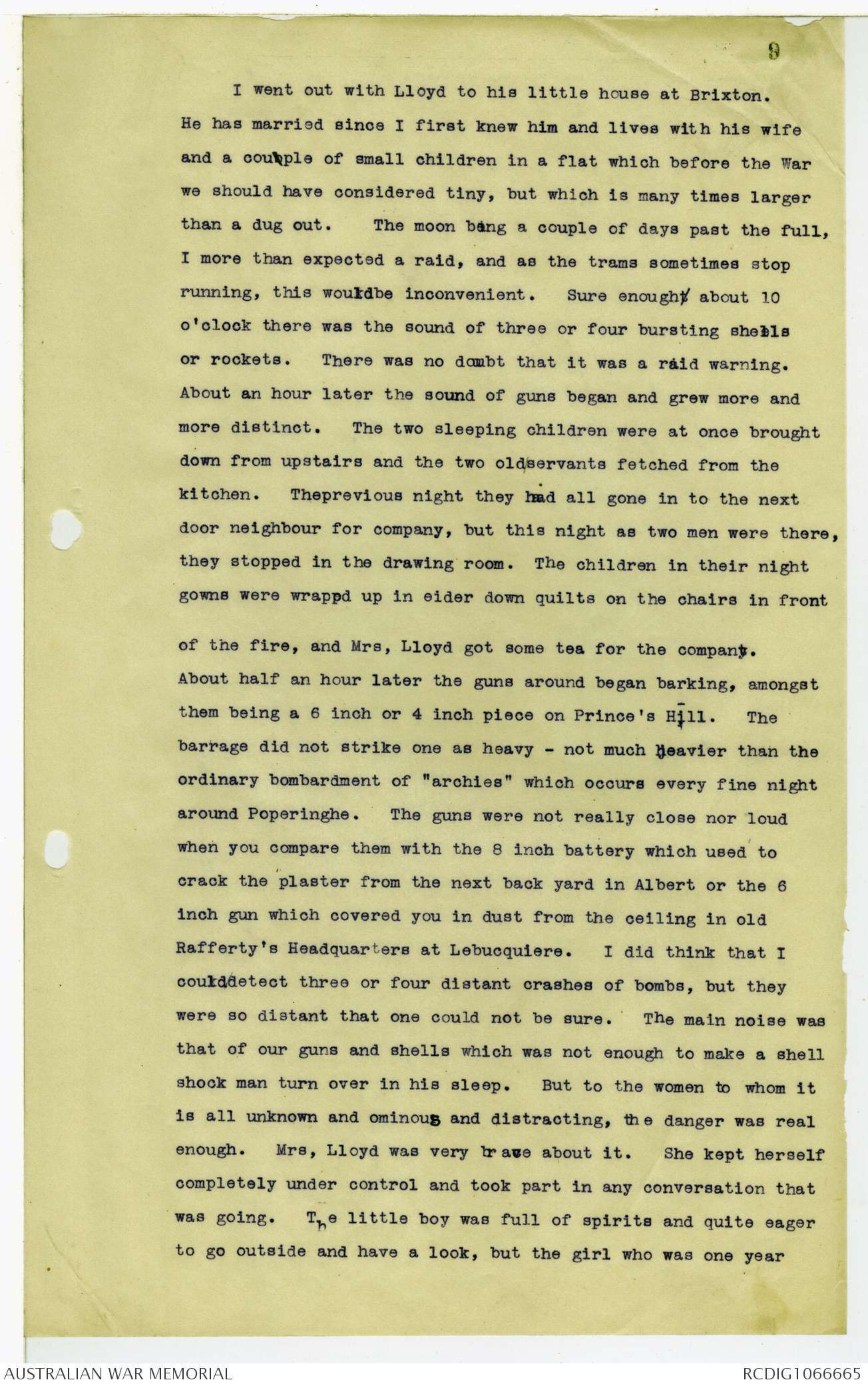
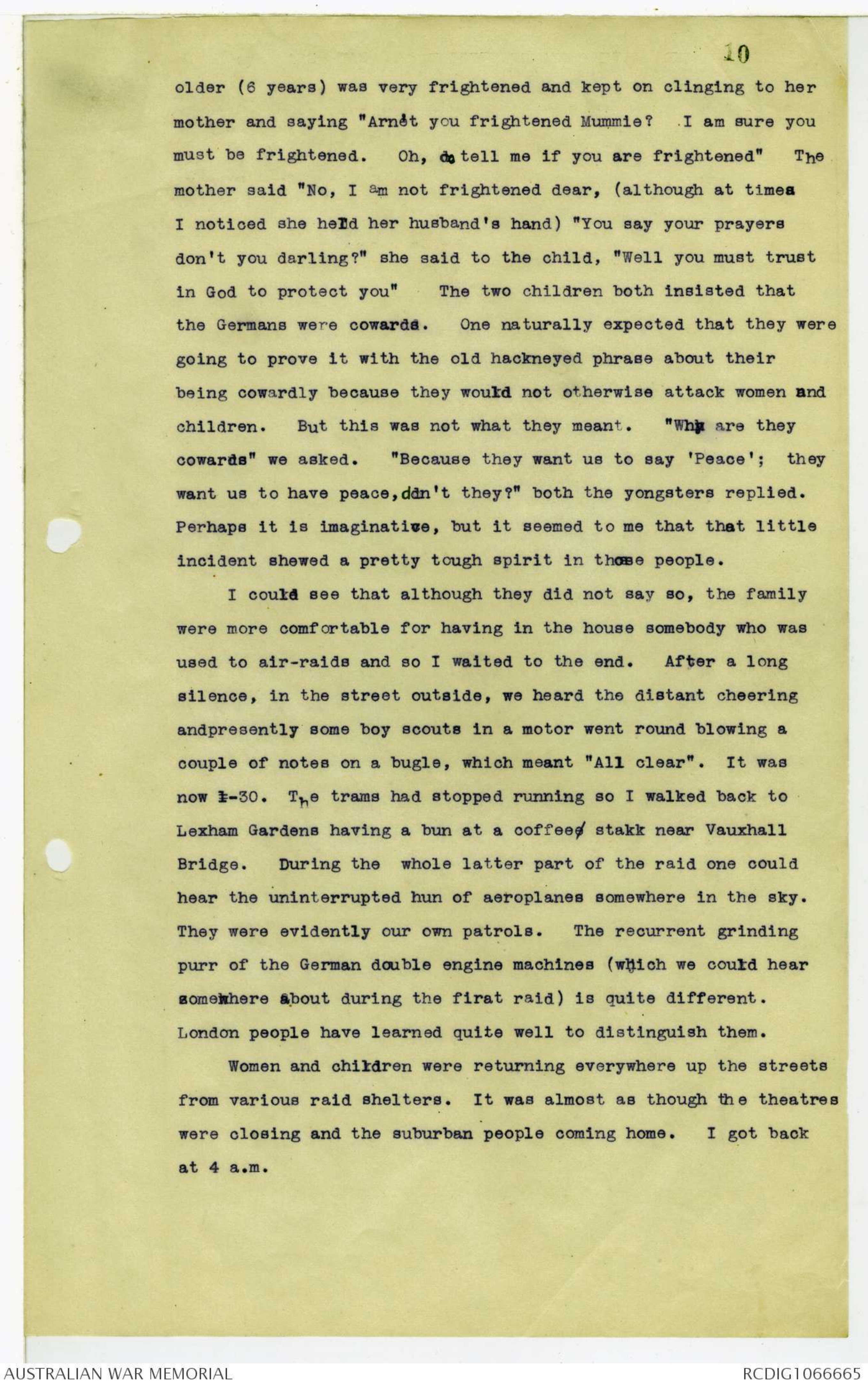
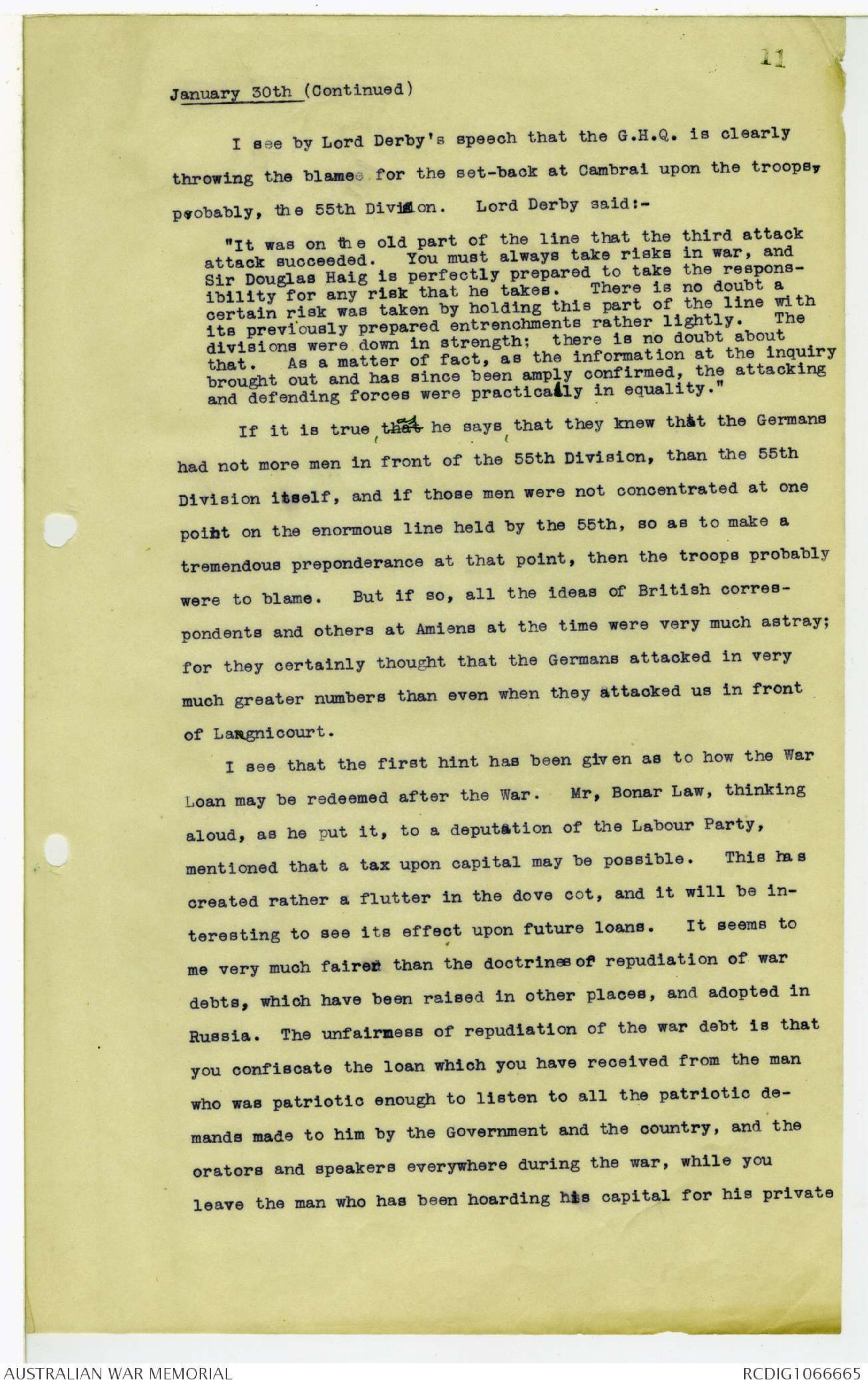
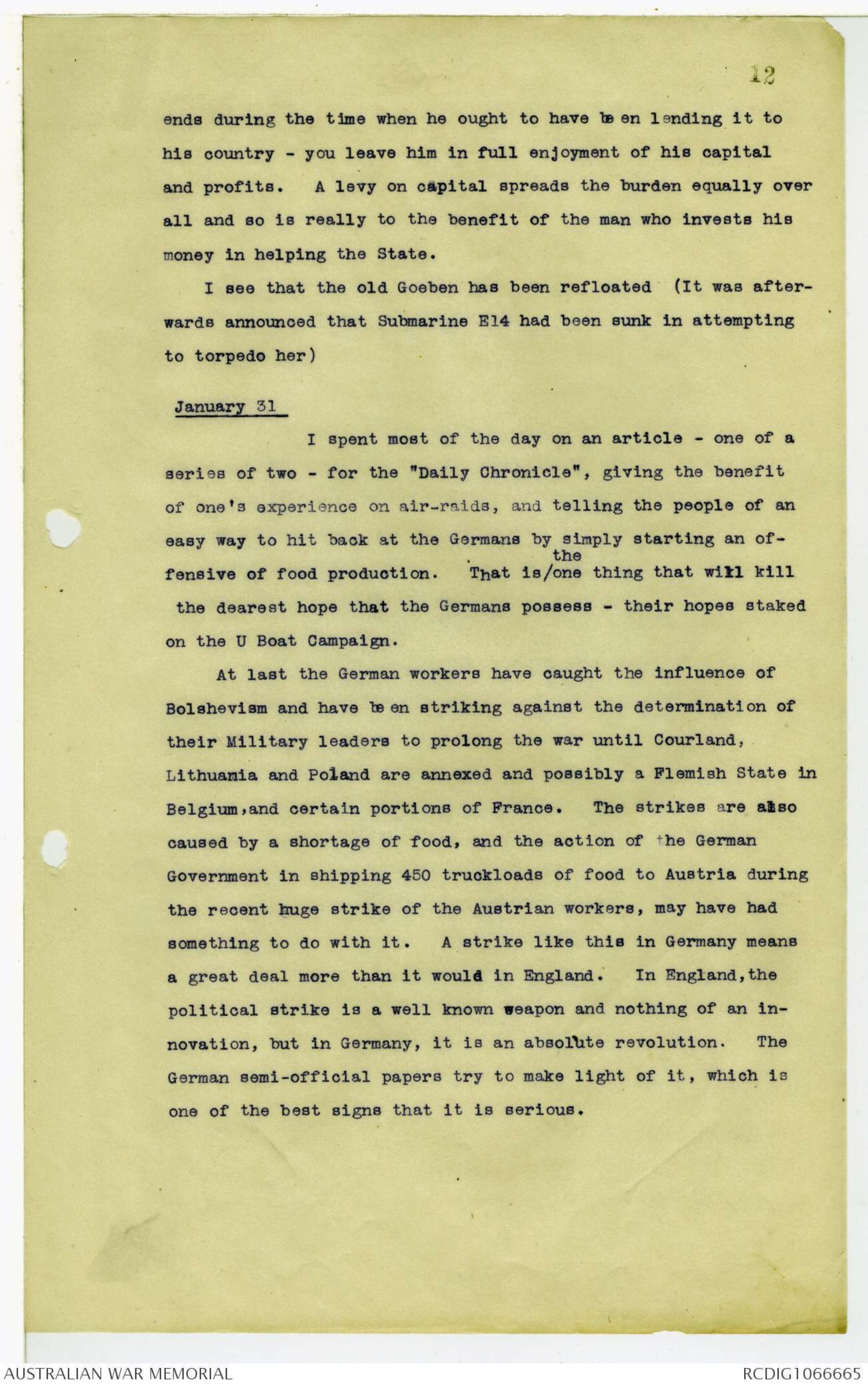
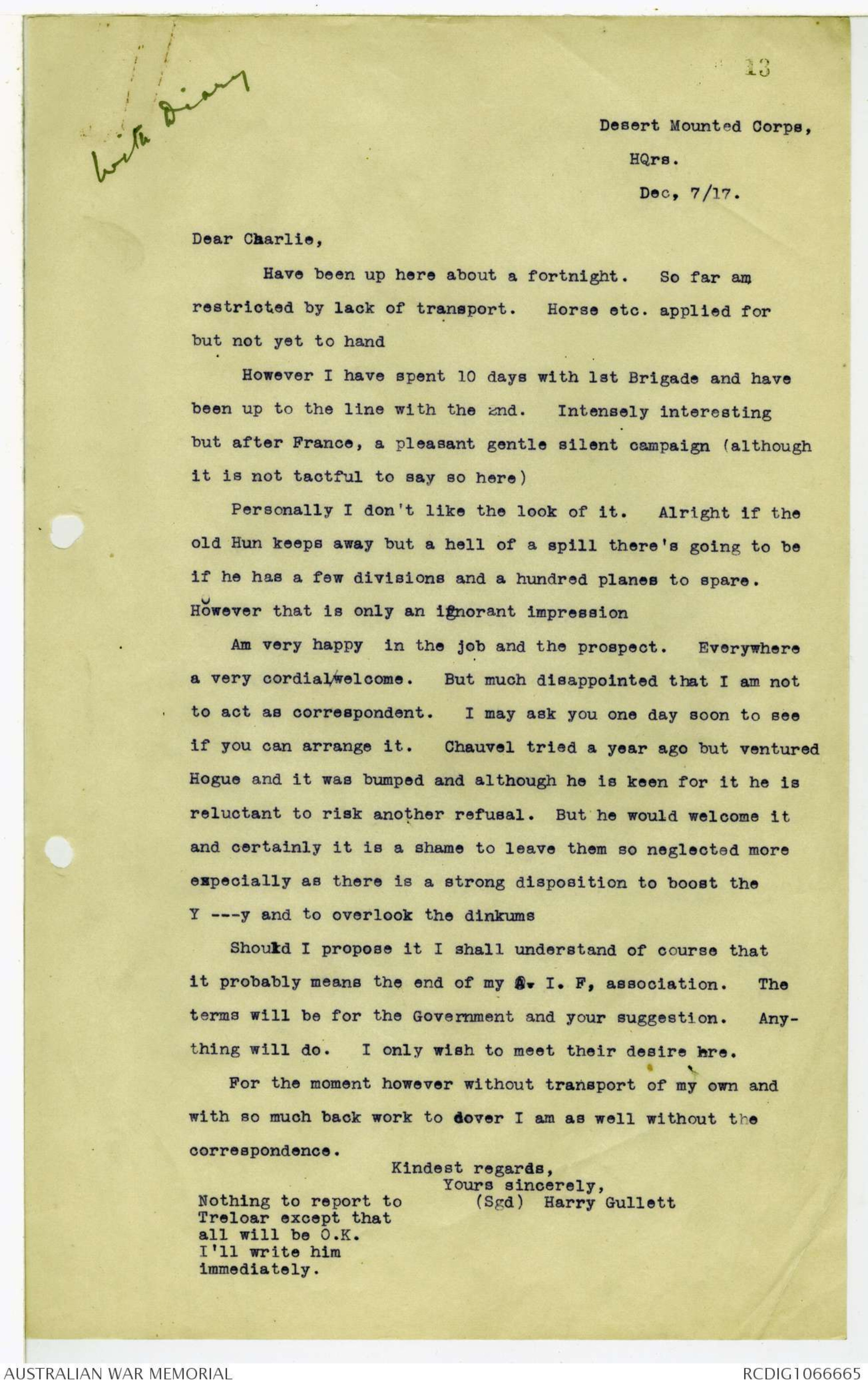
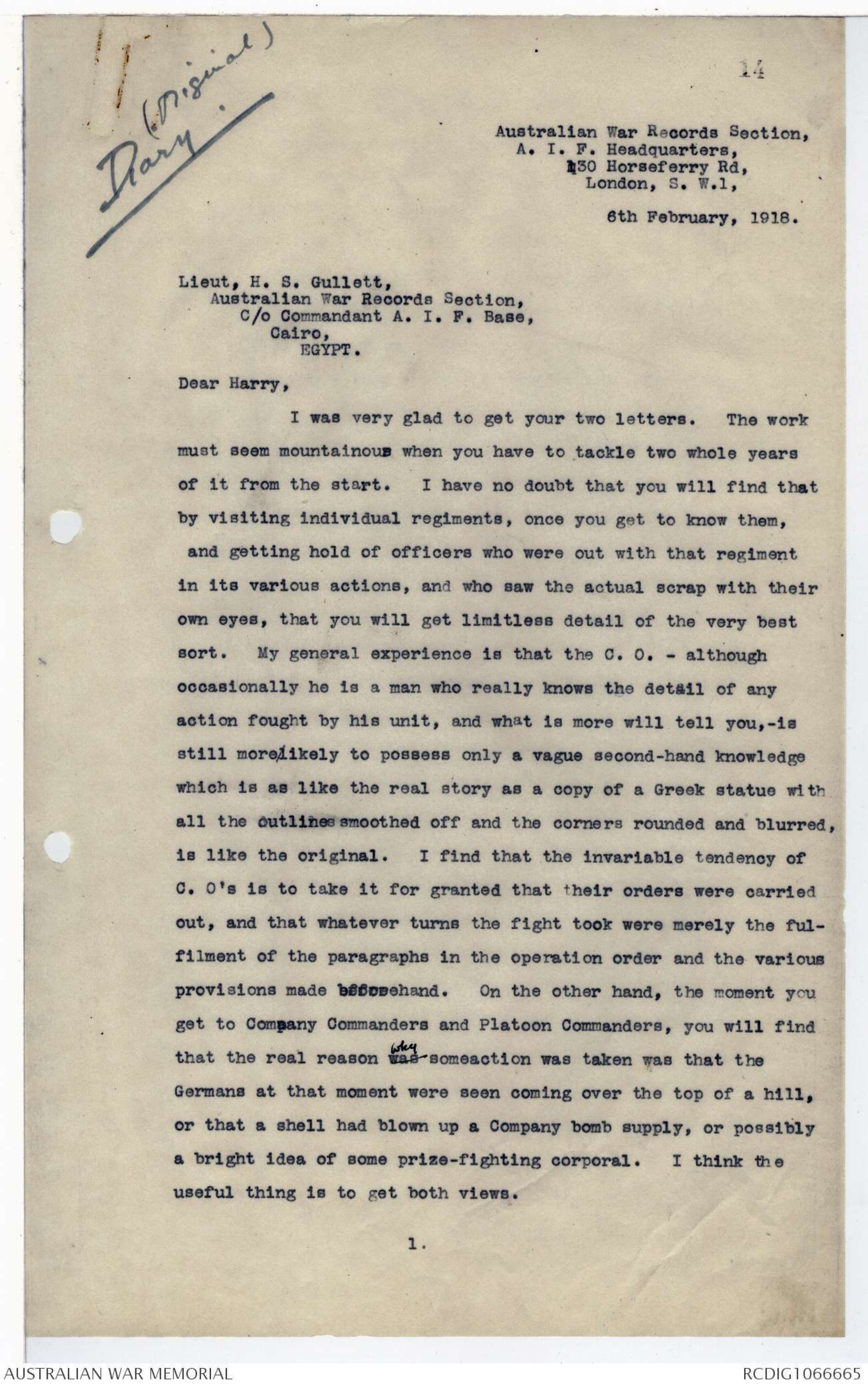
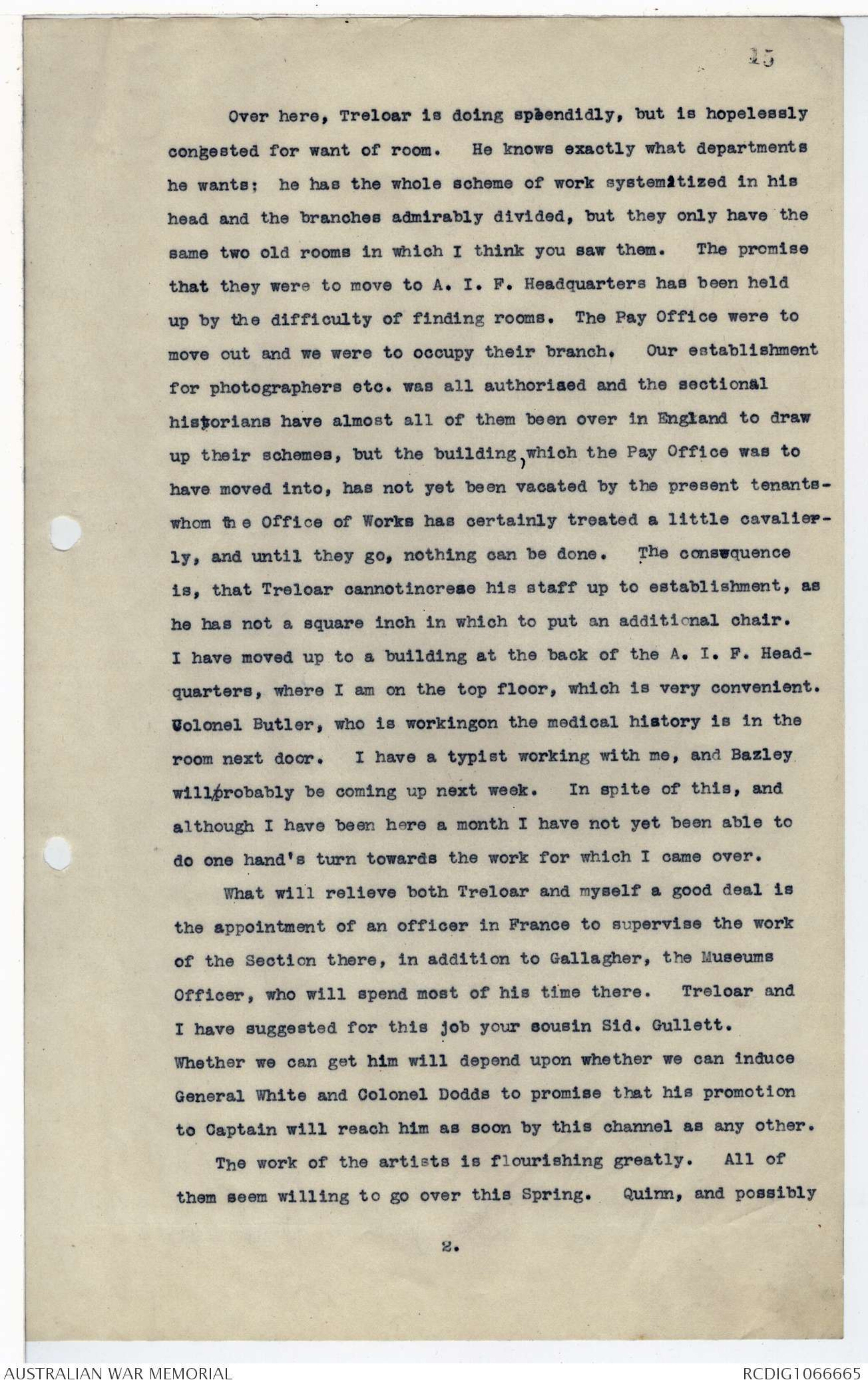
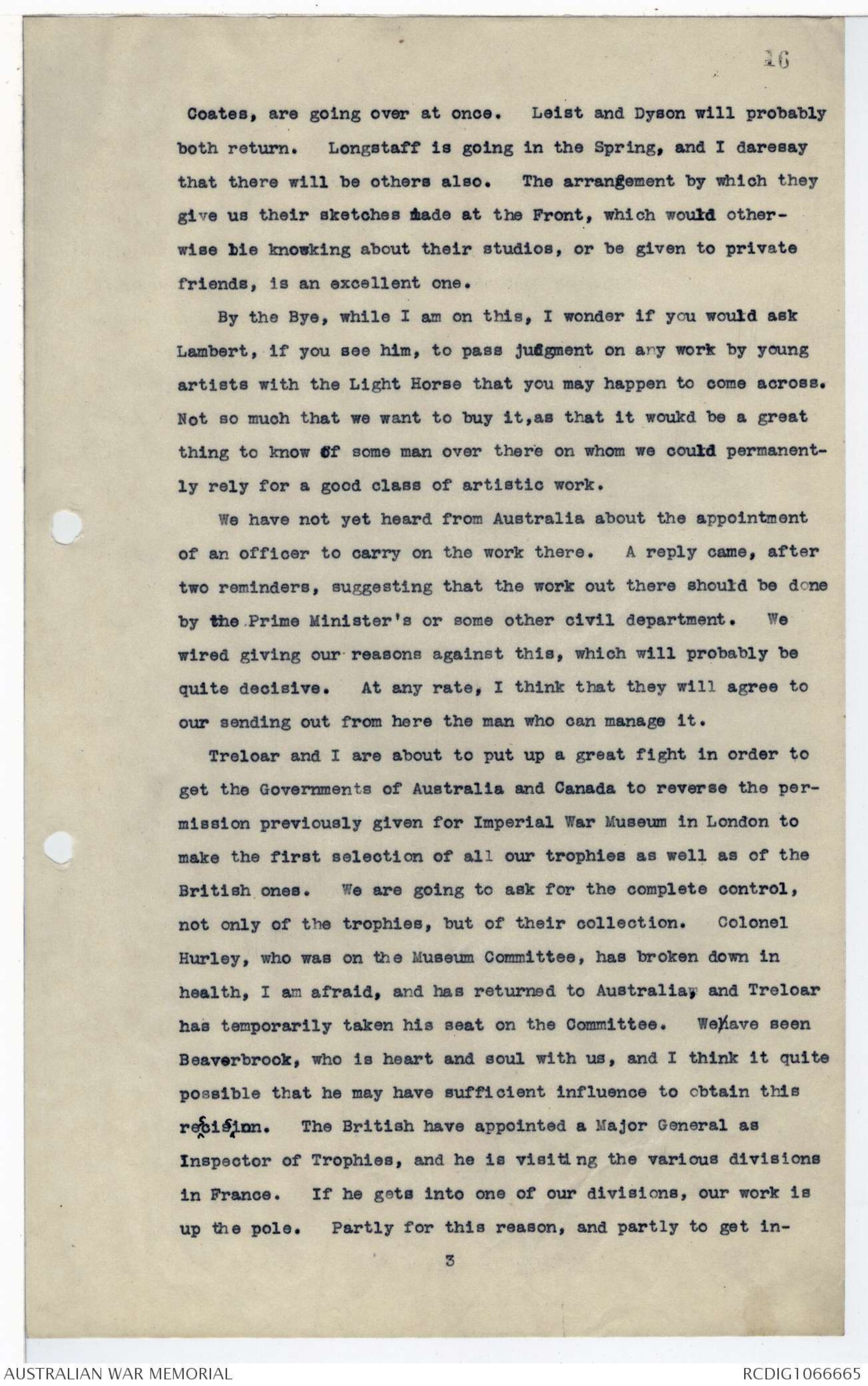
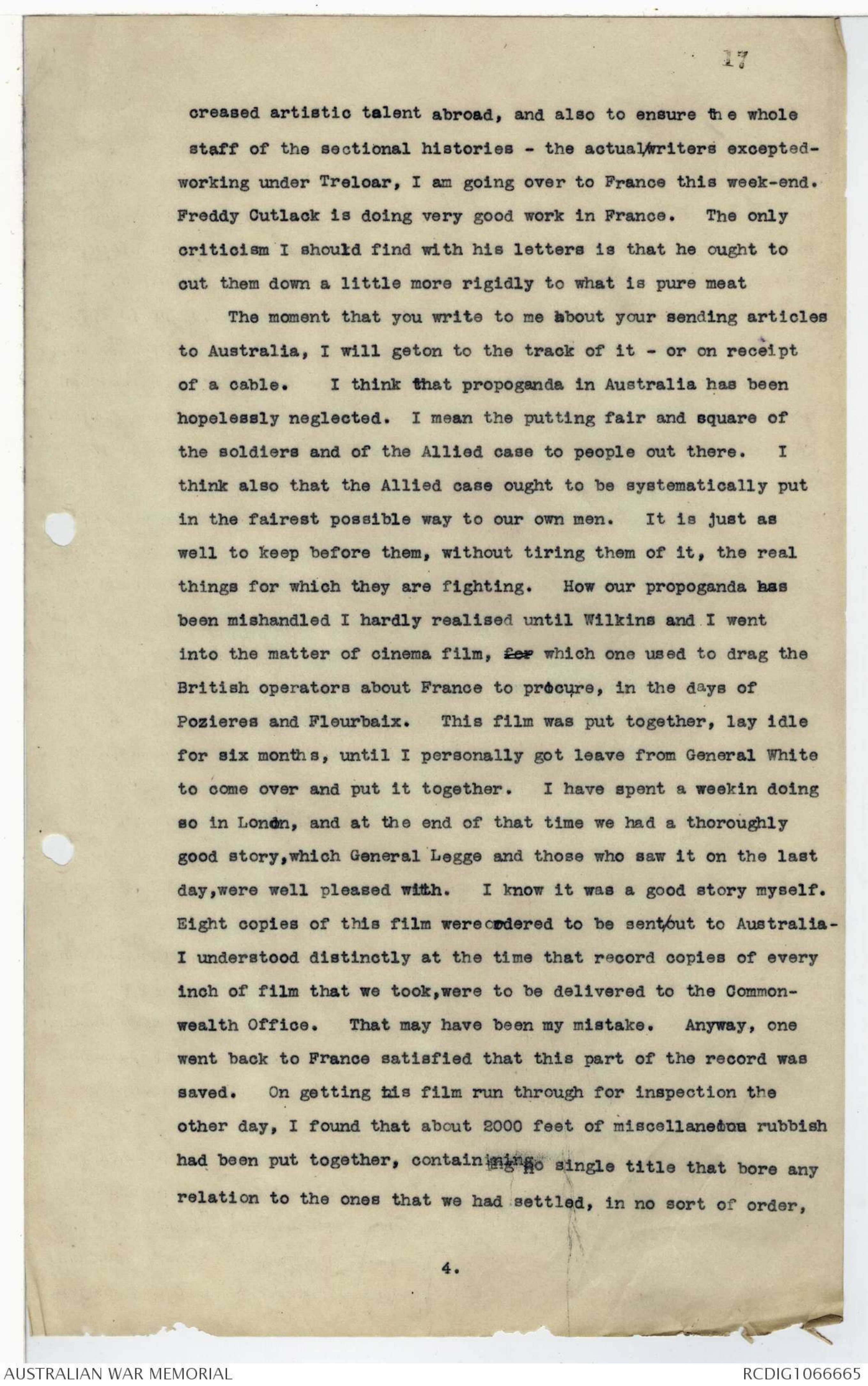
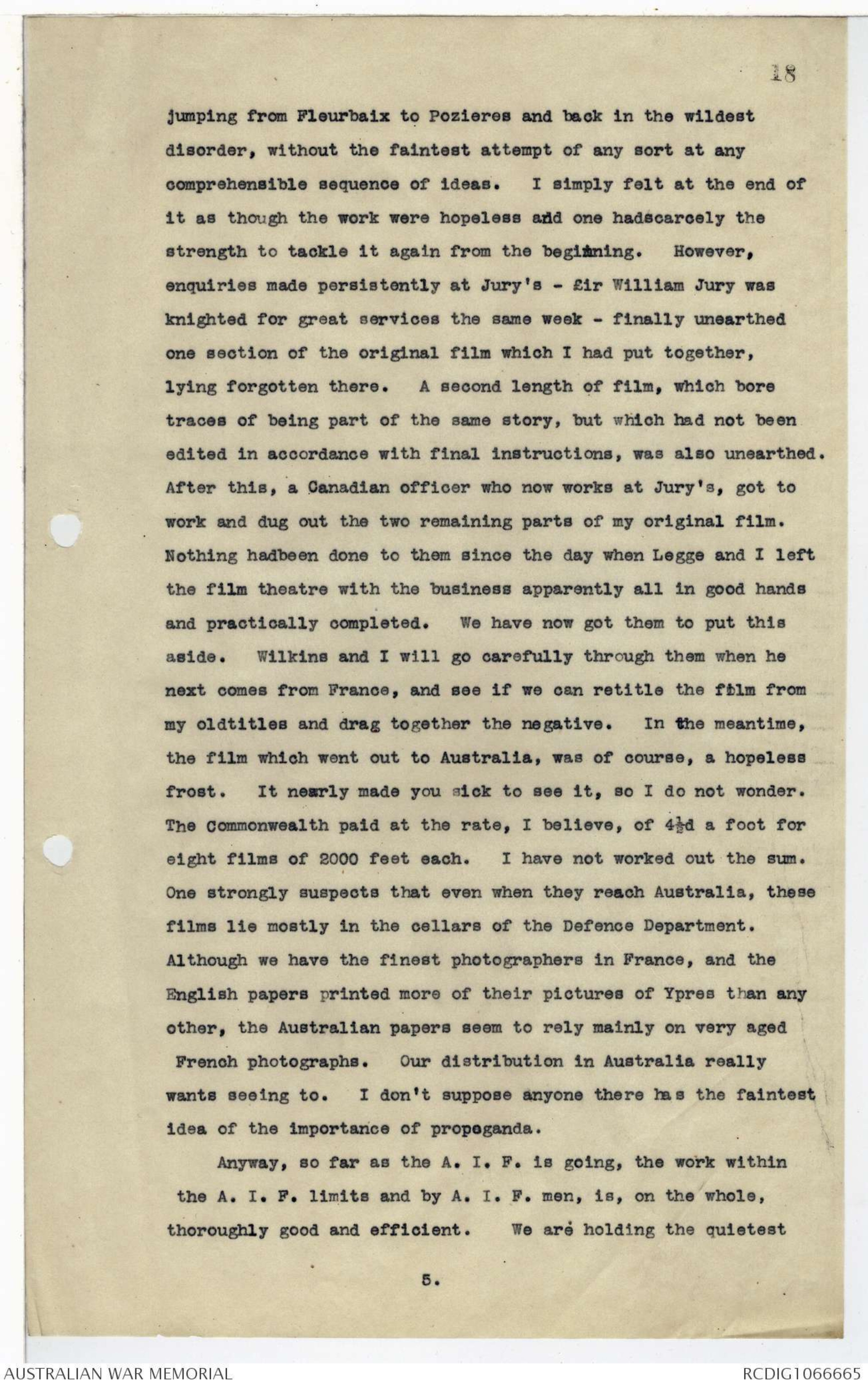
9
I went out with Lloyd to his little house at Brixton.
He has married since I first knew him and lives with his wife
and a couuple of small children in a flat which before the War
we should have considered tiny, but which is many times larger
than a dug out. The moon being a couple of days past the full,
I more than expected a raid, and as the trams sometimes stop
running, this wouldbe inconvenient. Sure enought about 10
o'olock there was the sound of three or four bursting shells
or rockets. There was no doubt that it was a raid warning.
About an hour later the sound of guns began and grew more and
more distinct. The two sleeping children were at once brought
down from upstairs and the two old/servants fetched from the
kitchen. Theprevious night they had all gone in to the next
door neighbour for company, but this night as two men were there,
they stopped in the drawing room. The children in their night
gowns were wrappd up in eider down quilts on the chairs in front
of the fire, and Mrs, Lloyd got some tea for the company.
About half an hour later the guns around began barking, amongst
them being a 6 inch or 4 inch piece on Prince's Hill. The
barrage did not strike one as heavy - not much heavier than the
ordinary bombardment of "archies" which occurs every fine night
around Poperinghe. The guns were not really close nor loud
when you compare them with the 8 inch battery which used to
crack the plaster from the next back yard in Albert or the 6
inch gun which covered you in dust from the ceiling in old
Rafferty's Headquarters at Lebucquiere. I did think that I
coulddetect three or four distant crashes of bombs, but they
were so distant that one could not be sure. The main noise was
that of our guns and shells which was not enough to make a shell
shock man turn over in his sleep. But to the women to whom it
is all unknown and ominous and distracting, the danger was real
enough. Mrs, Lloyd was very brave about it. She kept herself
completely under control and took part in any conversation that
was going. The little boy was full of spirits and quite eager
to go outside and have a look, but the girl who was one year
10
older (6 years) was very frightened and kept on clinging to her
mother and saying "Arn't you frightened Mummie? I am sure you
must be frightened. Oh, do tell me if you are frightened" The
mother said "No, I am not frightened dear, (although at times
I noticed she held her husband's hand) "You say your prayers
don't you darling?" she said to the child, "Well you must trust
in God to protect you" The two children both insisted that
the Germans were cowards. One naturally expected that they were
going to prove it with the old hackneyed phrase about their
being cowardly because they would not otherwise attack women and
children. But this was not what they meant. "Why are they
cowards" we asked. "Because they want us to say 'Peace'; they
want us to have peace, don't they?" both the yongsters replied.
Perhaps it is imaginative, but it seemed to me that that little
incident shewed a pretty tough spirit in those people.
I could see that although they did not say so, the family
were more comfortable for having in the house somebody who was
used to air-raids and so I waited to the end. After a long
silence, in the street outside, we heard the distant cheering
andpresently some boy scouts in a motor went round blowing a
couple of notes on a bugle, which meant "All clear". It was
now 1-30. The trams had stopped running so I walked back to
Lexham Gardens having a bun at a coffeee stakk near Vauxhall
Bridge. During the whole latter part of the raid one could
hear the uninterrupted hun of aeroplanes somewhere in the sky.
They were evidently our own patrols. The recurrent grinding
purr of the German double engine machines (which we could hear
somewhere about during the first raid) is quite different.
London people have learned quite well to distinguish them.
Women and children were returning everywhere up the streets
from various raid shelters. It was almost as though the theatres
were closing and the suburban people coming home. I got back
at 4 a.m.
11
January 30th (Continued)
I see by Lord Derby's speech that the G.H.Q. is clearly
throwing the blame for the set-back at Cambrai upon the troops,
probably, the 55th Division. Lord Derby said:-
"It was on the old part of the line that the third attack
attack succeeded. You must always take risks in war, and
Sir Douglas Haig is perfectly prepared to take the responsibility
for any risk that he takes. There is no doubt a
certain risk was taken by holding this part of the line with
its previously prepared entrenchments rather lightly. The
divisions were down in strength; there is no doubt about
that. As a matter of fact, as the information at the inquiry
brought out and has since been amply confirmed, the attacking
and defending forces were practically in equality."
If it is true, that as he says, that they knew that the Germans
had not more men in front of the 55th Division, than the 55th
Division itself, and if those men were not concentrated at one
point on the enormous line held by the 55th, so as to make a
tremendous preponderance at that point, then the troops probably
were to blame. But if so, all the ideas of British correspondents
and others at Amiens at the time were very much astray;
for they certainly thought that the Germans attacked in very
much greater numbers than even when they attacked us in front
of Langnicourt.
I see that the first hint has been given as to how the War
Loan may be redeemed after the War. Mr, Bonar Law, thinking
aloud, as he put it, to a deputation of the Labour Party,
mentioned that a tax upon capital may be possible. This has
created rather a flutter in the dove cot, and it will be interesting
to see its effect upon future loans. It seems to
me very much fairer than the doctrines of repudiation of war
debts, which have been raised in other places, and adopted in
Russia. The unfairness of repudiation of the war debt is that
you confiscate the loan which you have received from the man
who was patriotic enough to listen to all the patriotic demands
made to him by the Government and the country, and the
orators and speakers everywhere during the war, while you
leave the man who has been hoarding his capital for his private
12
ends during the time when he ought to have been lending it to
his country - you leave him in full enjoyment of his capital
and profits. A levy on capital spreads the burden equally over
all and so is really to the benefit of the man who invests his
money in helping the State.
I see that the old Goeben has been refloated (It was afterwards
announced that Submarine E14 had been sunk in attempting
to torpedo her)
January 31
I spent most of the day on an article - one of a
series of two - for the "Daily Chronicle", giving the benefit
of one's experience on air-raids, and telling the people of an
easy way to hit back at the Germans by simply starting an offensive
of food production. That is/ the one thing that will kill
the dearest hope that the Germans possess - their hopes staked
on the U Boat Campaign.
At last the German workers have caught the influence of
Bolshevism and have been striking against the determination of
their Military leaders to prolong the war until Courland,
Lithuania and Poland are annexed and possibly a Flemish State in
Belgium,and certain portions of France. The strikes are also
caused by a shortage of food, and the action of the German
Government in shipping 450 truckloads of food to Austria during
the recent huge strike of the Austrian workers, may have had
something to do with it. A strike like this in Germany means
a great deal more than it would in England. In England, the
political strike is a well known weapon and nothing of an innovation,
but in Germany, it is an absolute revolution. The
German semi-official papers try to make light of it, which is
one of the best signs that it is serious.
With Diary
13
Desert Mounted Corps,
HQrs.
Dec, 7/17.
Dear Charlie,
Have been up here about a fortnight. So far am
restricted by lack of transport. Horse etc. applied for
but not yet to hand
However I have spent 10 days with 1st Brigade and have
been up to the line with the 2nd. Intensely interesting
but after France, a pleasant gentle silent campaign (although
it is not tactful to say so here)
Personally I don't like the look of it. Alright if the
old Hun keeps away but a hell of a spill there's going to be
if he has a few divisions and a hundred planes to spare.
However that is only an ignorant impression
Am very happy in the job and the prospect. Everywhere
a very cordial/welcome. But much disappointed that I am not
to act as correspondent. I may ask you one day soon to see
if you can arrange it. Chauvel tried a year ago but ventured
Hogue and it was bumped and although he is keen for it he is
reluctant to risk another refusal. But he would welcome it
and certainly it is a shame to leave them so neglected more
especially as there is a strong disposition to boost the
Y -–-y and to overlook the dinkums
Should I propose it I shall understand of course that
it probably means the end of my A. I. F, association. The
terms will be for the Government and your suggestion. Anything
will do. I only wish to meet their desire hre.
For the moment however without transport of my own and
with so much back work to cover I am as well without the
correspondence.
Kindest regards,
Yours sincerely,
(Sgd) Harry Gullett
Nothing to report to
Treloar except that
all will be O.K.
I'll write him
immediately.
(Original)
Diary.
14
Australian War Records Section,
A. I. F. Headquarters,130 Horseferry Rd,
London, S. W.1,
6th February, 1918.
Lieut, H. S. Gullett,
Australian War Records Section,
C/o Commandant A. I. F. Base,
Cairo
EGYPT.
Dear Harry,
I was very glad to get your two letters. The work
must seem mountainous when you have to tackle two whole years
of it from the start. I have no doubt that you will find that
by visiting individual regiments, once you get to know them,
and getting hold of officers who were out with that regiment
in its various actions, and who saw the actual scrap with their
own eyes, that you will get limitless detail of the very best
sort. My general experience is that the C. 0. - although
occasionally he is a man who really knows the detail of any
action fought by his unit, and what is more will tell you,-is
still more/likely to possess only a vague second-hand knowledge
which is as like the real story as a copy of a Greek statue with
all the outlines smoothed off and the corners rounded and blurred,
is like the original. I find that the invariable tendency of
C. O's is to take it for granted that their orders were carried
out, and that whatever turns the fight took were merely the fulfilment
of the paragraphs in the operation order and the various
provisions made beforehand. On the other hand, the moment you
get to Company Commanders and Platoon Commanders, you will find
that the real reason was why someaction was taken was that the
Germans at that moment were seen coming over the top of a hill,
or that a shell had blown up a Company bomb supply, or possibly
a bright idea of some prize-fighting corporal. I think the
useful thing is to get both views.
1.
15
Over here, Treloar is doing splendidly, but is hopelessly
congested for want of room. He knows exactly what departments
he wants; he has the whole scheme of work systemitized in his
head and the branches admirably divided, but they only have the
same two old rooms in which I think you saw them. The promise
that they were to move to A. I. F. Headquarters has been held
up by the difficulty of finding rooms. The Pay Office were to
move out and we were to occupy their branch. Our establishment
for photographers etc. was all authorised and the sectional
historians have almost all of them been over in England to draw
up their schemes, but the building, which the Pay Office was to
have moved into, has not yet been vacated by the present tenants-
whom the Office of Works has certainly treated a little cavalierly,
and until they go, nothing can be done. The consequence
is, that Treloar cannotincrese his staff up to establishment, as
he has not a square inch in which to put an additional chair.
I have moved up to a building at the back of the A. I. F. Headquarters,
where I am on the top floor, which is very convenient.
Colonel Butler, who is workingon the medical history is in the
room next door. I have a typist working with me, and Bazley
will/probably be coming up next week. In spite of this, and
although I have been here a month I have not yet been able to
do one hand's turn towards the work for which I came over.
What will relieve both Treloar and myself a good deal is
the appointment of an officer in France to supervise the work
of the Section there, in addition to Gallagher, the Museums
Officer, who will spend most of his time there. Treloar and
I have suggested for this job your cousin Sid. Gullett.
Whether we can get him will depend upon whether we can induce
General White and Colonel Dodds to promise that his promotion
to Captain will reach him as soon by this channel as any other.
The work of the artists is flourishing greatly. All of
them seem willing to go over this Spring. Quinn, and possibly
2.
16
Coates, are going over at once. Leist and Dyson will probably
both return. Longstaff is going in the Spring, and I daresay
that there will be others also. The arrangement by which they
give us their sketches made at the Front, which would otherwise
bie knowking about their studios, or be given to private
friends, is an excellent one.
By the Bye, while I am on this, I wonder if you would ask
Lambert, if you see him, to pass judgment on any work by young
artists with the Light Horse that you may happen to come across.
Not so much that we want to buy it,as that it woukd be a great
thing to know of some man over there on whom we could permanently
rely for a good class of artistic work.
We have not yet heard from Australia about the appointment
of an officer to carry on the work there. A reply came, after
two reminders, suggesting that the work out there should be done
by the Prime Minister's or some other civil department. We
wired giving our reasons against this, which will probably be
quite decisive. At any rate, I think that they will agree to
our sending out from here the man who can manage it.
Treloar and I are about to put up a great fight in order to
get the Governments of Australia and Canada to reverse the permission
previously given for Imperial War Museum in London to
make the first selection of all our trophies as well as of the
British ones. We are going to ask for the complete control,
not only of the trophies, but of their collection. Colonel
Hurley, who was on the Museum Committee, has broken down in
health, I am afraid, and has returned to Australia, and Treloar
has temporarily taken his seat on the Committee. We/have seen
Beaverbrook, who is heart and soul with us, and I think it quite
possible that he may have sufficient influence to obtain this
re^scis^sion. The British have appointed a Major General as
Inspector of Trophies, and he is visiting the various divisions
in France. If he gets into one of our divisions, our work is
up the pole. Partly for this reason, and partly to get increased
3
17
artistic talent abroad, and also to ensure the whole
staff of the sectional histories - the actual/writers excepted-
working under Treloar, I am going over to France this week-end.
Freddy Cutlack is doing very good work in France. The only
criticism I should find with his letters is that he ought to
cut them down a little more rigidly to what is pure meat
The moment that you write to me about your sending articles
to Australia, I will geton to the track of it - or on receipt
of a cable. I think that propoganda in Australia has been
hopelessly neglected. I mean the putting fair and square of
the soldiers and of the Allied case to people out there. I
think also that the Allied case ought to be systematically put
in the fairest possible way to our own men. It is just as
well to keep before them, without tiring them of it, the real
things for which they are fighting. How our propoganda has
been mishandled I hardly realised until Wilkins and I went
into the matter of cinema film, for which one used to drag the
British operators about France to procure, in the days of
Pozieres and Fleurbaix. This film was put together, lay idle
for six months, until I personally got leave from General White
to come over and put it together. I have spent a weekin doing
so in London, and at the end of that time we had a thoroughly
good story, which General Legge and those who saw it on the last
day, were well pleased with. I know it was a good story myself.
Eight copies of this film were ordered to be sent/out to Australia-
I understood distinctly at the time that record copies of every
inch of film that we took, were to be delivered to the Commonwealth
Office. That may have been my mistake. Anyway, one
went back to France satisfied that this part of the record was
saved. On getting this film run through for inspection the
other day, I found that about 2000 feet of miscellaneous rubbish
had been put together, containing no single title that bore any
relation to the ones that we had settled, in no sort of order,
4.
18
jumping from Fleurbaix to Pozieres and back in the wildest
disorder, without the faintest attempt of any sort at any
comprehensible sequence of ideas. I simply felt at the end of
it as though the work were hopeless and one hadscarcely the
strength to tackle it again from the beginning. However,
enquiries made persistently at Jury's - £ir William Jury was
knighted for great services the same week - finally unearthed
one section of the original film which I had put together,
lying forgotten there. A second length of film, which bore
traces of being part of the same story, but which had not been
edited in accordance with final instructions, was also unearthed.
After this, a Canadian officer who now works at Jury's, got to
work and dug out the two remaining parts of my original film.
Nothing hadbeen done to them since the day when Legge and I left
the film theatre with the business apparently all in good hands
and practically completed. We have now got them to put this
aside. Wilkins and I will go carefully through them when he
next comes from France, and see if we can retitle the film from
my oldtitles and drag together the negative. In the meantime,
the film which went out to Australia, was of course, a hopeless
frost. It nearly made you sick to see it, so I do not wonder.
The Commonwealth paid at the rate, I believe, of 4½d a foot for
eight films of 2000 feet each. I have not worked out the sum.
One strongly suspects that even when they reach Australia, these
films lie mostly in the cellars of the Defence Department.
Although we have the finest photographers in France, and the
English papers printed more of their pictures of Ypres than any
other, the Australian papers seem to rely mainly on very aged
French photographs. Our distribution in Australia really
wants seeing to. I don't suppose anyone there has the faintest
idea of the importance of propoganda.
Anyway, so far as the A. I. F. is going, the work within
the A. I. F. limits and by A. I. F. men, is, on the whole,
thoroughly good and efficient. We are holding the quietest
5.
 Diane Ware
Diane WareThis transcription item is now locked to you for editing. To release the lock either Save your changes or Cancel.
This lock will be automatically released after 60 minutes of inactivity.